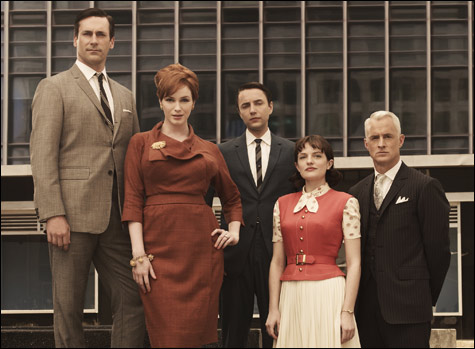
From left, Don Draper (played by Jon Hamm), Joan Holloway (Christine Hendricks), Pete Campbell (Vincent Kartheiser), Peggy Olson (Elisabeth Moss), and Roger Sterling (John Slattery). |
This Sunday is the premiere of the third season of Mad Men (AMC, 10 pm), the Emmy-winning show that made fans of good television have to figure out where AMC was on their basic-cable schedules. Created and masterminded to an insane level of period accuracy and detail by former Sopranos writer Matthew Weiner, Mad Men follows outwardly dapper, inwardly tormented ad man Don Draper (Jon Hamm) as he makes his progress through the American '60s. The last we saw of him at the end of season two, during the Cuban Missile Crisis, Draper had returned from a purgatorial lost weekend in California, outwitted a rival at work, and been allowed back home by long-suffering wife Betty (January Jones), who informed him she was pregnant.
Such a bare-bones plot summary could make someone who hasn't seen the show think that this is merely another period melodrama, a John Cheever knockoff for the small screen with touches of Peyton Place. In fact, Mad Men deliberately avoids all the tropes of generic TV melodrama (e.g., clichéd sentiment, easy moralizing, heartstring-pulling soundtracks) to deliver characters and situations full of vagueness and loaded silences. There's something of Hitchcock's upfront perversity regarding human relations in Weiner's universe, and, for a few brief moments, the fundamental loneliness displayed harkens back to the best of Antonioni. What's left unsaid to play and replay itself in the viewer's imagination is the key element guiding the writing, the acting, and the nuanced direction and editing. As Weiner explained in this month's Vanity Fair: "I count on my subconscious to be consistent. And how that works I have no fucking idea, and I don't even want to investigate it. Because if I lose that I have nothing to say."
A telling, serendipitous juxtaposition occurred during last fall's season: one of the commercial breaks cut to a trailer for Revolutionary Road, the big-budget, Oscar-baiting Sam Mendes adaptation of Richard Yates's cult novel about a couple's disintegration that roughly shares time, place, and many themes with Mad Men. Compared with the show it was interrupting, the Leonardo DiCaprio–Kate Winslet vehicle looked overblown and, well, melodramatic in the worst way. (It didn't help that DiCaprio still looks and sounds like a whiney boy, while Hamm's Draper is a walking monument to troubled testosterone.)
Quality television comes at a price, though: you, me, and everyone we know — to paraphrase Miranda July — watches, has watched, or intends to Netflix-queue Mad Men, Arrested Development, Battlestar Galactica, The Wire, etc. But you, me, and everyone we know are between one and two million viewers in a potentially 10 or 20 times larger market that tends to reward with its ad-rate-setting eyeballs shows like the well-made but shallow CSI, the execrable Two and a Half Men, and the current, debased generation of "reality" programs like Real Chance of Love 2.